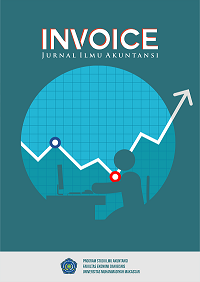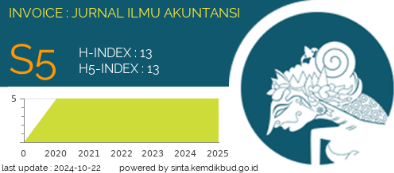Spiritual Accounting: The Meaning of Income in Rambu Solo' Culture in Tana Toraja Regency
DOI: https://doi.org/10.26618/inv.v6i2.14455
Abstract
The purpose of this study was to determine and analyse the meaning of income in the rambu solo' culture in Tana Toraja Regency from a spiritual accounting perspective. This research uses an Interpretative Phenomenological Analysis (IPA) approach using a spiritual-religious paradigm. The data obtained came from various literature and interview sources selected based on purposive sampling, with Divine Command Theory (DCT) as the analytical knife of this research. The results of this study show that: (1) Income in the rambu solo' culture occurs due to economic activity in the frame of the principle of helping and easing each other's burdens (kasianggaran) at the time of mourning. Income is not only obtained by the to mate family but all stakeholders feel the impact of rambu solo' activities . Especially in the fields of tourism, hospitality, MSMEs, animal husbandry, village development, and Income Per Capita (IPC). (2) Income based on a non-material perspective in the frame of spiritual accounting. Based on aluk todolo belief, blessings come from titinan tallu tirindu batu lalikan for to mate and to lino. While Christianity blessings come from God alone to to lino. The benefits of the implementation of rambu solo' received by tomate are animals sacrificed as provisions for the journey to puya and become tomembali puang. Meanwhile, tolino gained peace, prosperity, increased spirit of hard work, fellowship, brotherhood, shame patriotism, honesty, mutual help, mutual love, religion and development and preservation of arts & culture.
References
Amaliah, T. H. (2016). Nilai-Nilai Budaya Tri Hita KArana Penetapan Harga Jual. Jurnal Akuntansi Multiparadigma, 7(6).
Asriandi, Tenriwaru, & Junaid, A. (2021). "Filosofi Budaya Lempu’ Na Getteng dalam Perspektif Kepatuhan Wajib Pajak Pelaku Usaha Mikro Kecil Menengah. YUME : Journal of Management, 4,(2), 134–144. https://doi.org/10.37531/yum.v11.
Badrullah. (2020). Sipatokkong BPSDM Sulawesi Selatan. Jurnal Sipatokkong BPSDM Sulawesi Selatan, 1(2), 137–142.
Baumeister, R. F., & Leary, M. R. (1995). The need to belong: Desire for interpersonal attachments as a fundamental human motivation. Psychological Bulletin, 117(3), 497–529.
Dinas Kebudayaan Kabupaten Tana Toraja, 2019. Agama, Budaya dan adat istiadat Toraja. Toraja: Dinas Kebudayaan Kab. Tana Toraja.
Gama, M. (2019). Akuntansi sebagai Realitas: Spiritual Accounting dalam Paradigma Naturalistik (Studi pada PT Biota Laut Ganggang).
Guntara, Fuad, dkk. (2016). Kajian Sosial-Budaya Rambu Solo Dalam Pembentukan Karakter Perserta Didik. Jurnal Pendidikan: Teori, Penelitian, dan Pengembangan, 1(2).
Gusti Ayu dkk. (2015). "Kontroversi Manajemen Laba: Prespektif Etika, Spiritualitas, dan Political Ekonomy Of Accounting (PEA)". Jurnal Ilmiah Akuntansi Menajemen, 9(2).
Hidayat, S., & Triyuwono, I. (2016). Praktik Penentuan Harga Jual Berbasis Meuramin. Jurnal Akuntansi Multiparadigma, 10(1). https://doi.org/10.18202/jamal.2016.12.7024.
Ikatan akuntansi Indonesia. 2021. “Modul chartered Accountant: Pelaporan Korporat”, Jakarta: Ikatan Akuntansi Indonesia.
Inglehart, Ronald, and Christian Welzel. 2005.Modernization, Cultural Change, and Democracy: The Human Development Sequence. Cambridge University Press.
Jones, A. (2023). Spiritual Dimensions of Community Projects. Journal of Social Harmony, 10(3), 78-91.
Lee, Sarah. (2014) The Role of Accounting in Cultural Organizations: Balancing Financial and Non-Financial Objectives. Journal of Cultural Economics, 38(2), h. 187-202.
Lyubomirsky, S., King, L., & Diener, E. (2005). The benefits of frequent positive affect: Does happiness lead to success? Psychological Bulletin, 131(6), 803–855.
Martin, S. (2016). Spiritual Accounting: The Role of Spirituality in the Financial Services Industry. Routledge.
Masseleng, Marrang Paranoan. 1990. Upacara Kematian Orang Toraja Analisis Psiko-Sosio-Kultural, (Ujung Pandang: Lembaga Penerbitan Universitas Hasanuddin.
Mekarisce, A. Augina. (2020) ‘Teknik Pemeriksaan Keabsahan Data pada Penelitian Kualitatif di Bidang Kesehatan Masyarakat’, Jurnal Ilmiah Kesehatan Masyarakat, 12(3).
Mulawarman, A. D. (2010). Integrasi Paradigma Akuntansi: Refleksi atas Pendekatan Sosiologi dalam Ilmu Akuntansi. Jurnal Akuntansi Multiparadigma, 1(1). https://doi.org/10.18202/jamal.2010.04.7086.
Palmer, C. L. (2001). What’s love got to do with it? Materiality, morality, and Toraja funeral gifts. Journal of the Royal Anthropological Institute, 7(3), 471–490.
Pemerintah Daerah Tana Toraja. 2013. Sumbangan Pemikiran Toraya Ma’Kombongan “santiangkaran Umpakalebu Pa’inaan Umbangun Sangtorayan Lan Lili’na Indonesia’. Yogyakarta: Gunung Sampoi.
Rahman, B. (2022). Spiritual Growth through Accountability: Lessons from Cultural Practices. Journal of Spiritual Development, 7(1), 34-47.
Sandarupa, Stanislauis. 2016. Kambunni’ Kebudayaan Tallu LOlona Toraja. Makassar: De La Macca.
Sarira, Y.A. 1996. Aluk Rambu Solo’ Persepsi Orang Kristen Tantang Rambu Solo. Tana Toraja: Pusbang Gereja Toraja.
Satori, Djam’an dan Aan Komariah. 2017. Metodologi Penelitian Kualitatif (Bandung: Alfabeta).
Smith, J. (2020). Spiritual Accounting: Integrating Faith into Work. Journal of Spiritual Management, 15(2), 45-58.
Smith, John. (2018). The Importance of Arts and Culture in Society.Journal of Cultural Economics, 42(3), h.267-283.
Triyuwono, I. (1997). Akuntansi Syari’ah dan Koperasi Mencari Bentu dalam BIngkai Metafora Amanah. Jurnal Akuntansi Dan Auditiing Indonesia, 1(4). https://media.neliti.com/media/publications/260591 none5c5c81a4.pd
Tumirin, Abdurahim, A. (2015). Makna Biaya dalam Upacara Rambu Solo’. Jurnal Akuntansi Multiparadigma (JAMAL), h. 6(2) https://doi.org/10.18202/jamal.2015.08.6012,
Williams,Thomas. 2013. "John Duns Scotus". Dalam Edward N. Zalta. John Duns Scotus. The Stanford Encyclopedia ofPhilosophy.https://plato.stanford.edu/entries/voluntarism-theological/#Bib diakses 18 Septemeber 2023).
Downloads
Published
Issue
Section
License
Authors who publish with Invoice: Jurnal Ilmu Akuntansi agree to the following terms:
-
Copyright Ownership
The copyright of all articles published in this journal remains with the author(s). However, the authors grant Invoice: Jurnal Ilmu Akuntansi the right of first publication with the work simultaneously licensed under a Creative Commons Attribution 4.0 International License (CC BY 4.0). This license allows others to share, copy, redistribute, adapt, and build upon the work for any purpose, even commercially, as long as proper credit is given to the original author(s) and the source. -
Licensing and Access
Invoice: Jurnal Ilmu Akuntansi provides immediate open access to its content on the principle that making research freely available to the public supports a greater global exchange of knowledge. All published materials are available freely without subscription or payment and can be accessed, downloaded, and reused by any user provided that appropriate attribution is given. -
Permission for Reuse
For uses not covered by the CC BY 4.0 license, such as commercial reprints, translations, or any form of adaptation without clear attribution, users must obtain written permission from the editorial team. Requests for such permissions can be directed to the editorial office at: [invoice@unismuh.ac.id]. -
Plagiarism and Originality
Authors are responsible for the originality of their submissions. All articles are screened for plagiarism using appropriate tools before acceptance. Manuscripts found to contain unoriginal content or infringing materials will be rejected or retracted as per journal policy.














